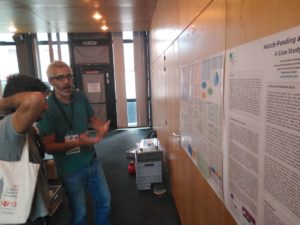Last week from Dimmons we had the opportunity to participate at the OpenSym18 conference in Paris, the international symposium dedicated to open collaboration research and practice. We were presenting our work in two different areas related to the collaborative economy. On the one hand, we presented an analysis of technological and knowledge practices and their implications for the platform governance of of collaborative digital platforms, based on a sample of 100 cases in Barcelona (authored by Ricard Espelt and Mayo Fuster). On the other one, an analysis of match-funding as a formula for crowdfunding, using data collected on the behaviour in several match-funding calls for projects on Goteo in the last five years (by Enric Senabre and Mayo Fuster). Below you can see and download both posters, which are also related to the respective proceedings published at the ACM library here: governance of of collaborative digital platforms; and here: study about match-funding formula.
The conference was also a great opportunity to discover and discuss new exciting research around wikipedia, wikis and online collaboration. In our case, connecting to current challenges and questions when it comes to address value or communication dynamics in peer-to-peer initiatives and around the sustainability of open communities. From that perspective, it was interesting to discover how the concept of stigmergy was analysed in Wikipedia by Kevin Crowston (Syracuse University) in relation to quality, but also how it could relate to social dynamics in areas like citizen science or even online mobility apps such as Uber. Another great presentation was from the researchers Javier Arroyo and Abel Serrano (Universidad Complutense de Madrid), who are addressing the important task of studying the census of Wikia communities or how inequality takes place in such systems, not only in terms of focusing on a smaller but also relevant community compared to the immense Wikipedia, but also for their radically open approach of creating replicable tools for others to benefit from their work, like in the case of WikiChron.

From the perspective of how contributions in software code can be as relevant as academic and scientific knowledge, another interesting project presentation was the one related to The Software Heritage portal by Stefano Zacchiroli, who is collecting all the existing software for its preservation and reuse. In relation to value generated by open projects, the presentation Estimating the Value of Wikimedia Imagery by Observing Downstream Use studied the positive economic impact of Commons, based on a random sample of 10.000 images from Wikimedia Commons, where the majority has the type of license CC-BY-SA.
Finally, among other studies presented and discussed in the conference, the presentation by Ludovic Dubost, CEO of XWiki (an open source project for wikis in companies), addressed several important challenges in relation to economic sustainability and business models in open source. From his perspective and experience, in times when Commons are becoming the “commons of the Capital”, alternatives to fund open source projects, beyond the software-as-a-service model, should evolve via research alliances (with universities and public institutions), as well as in combination with new crowdfunding models like OpenCollective or Liberapay. Considering how currently open source could be missing the last mile, in front of interconnected giants like Apple or Google, and in absence of better development and advances when it comes to front end and user interfaces, Ludovic’s presentation leaded to a discussion about how seems critical to improve efficient financing sstrategies for open source software, beyond enterprise models. To change the idea that open source is free as “gratis”, something that leads to how users need to consider the possibility of models like subscriptions, and in general to learn to pay again for useful tools in the open.